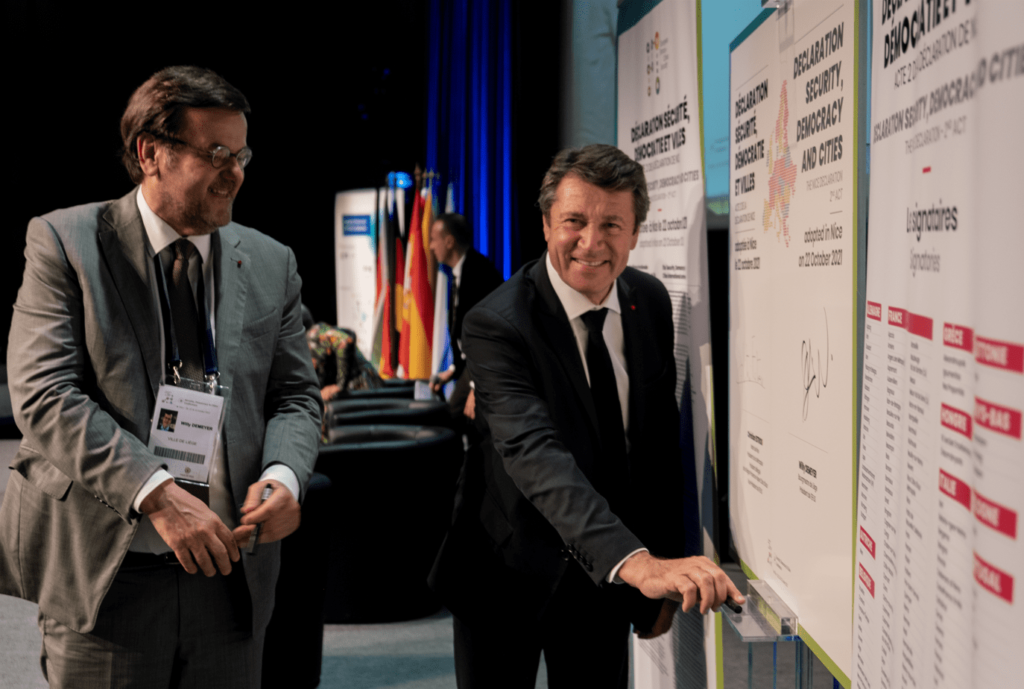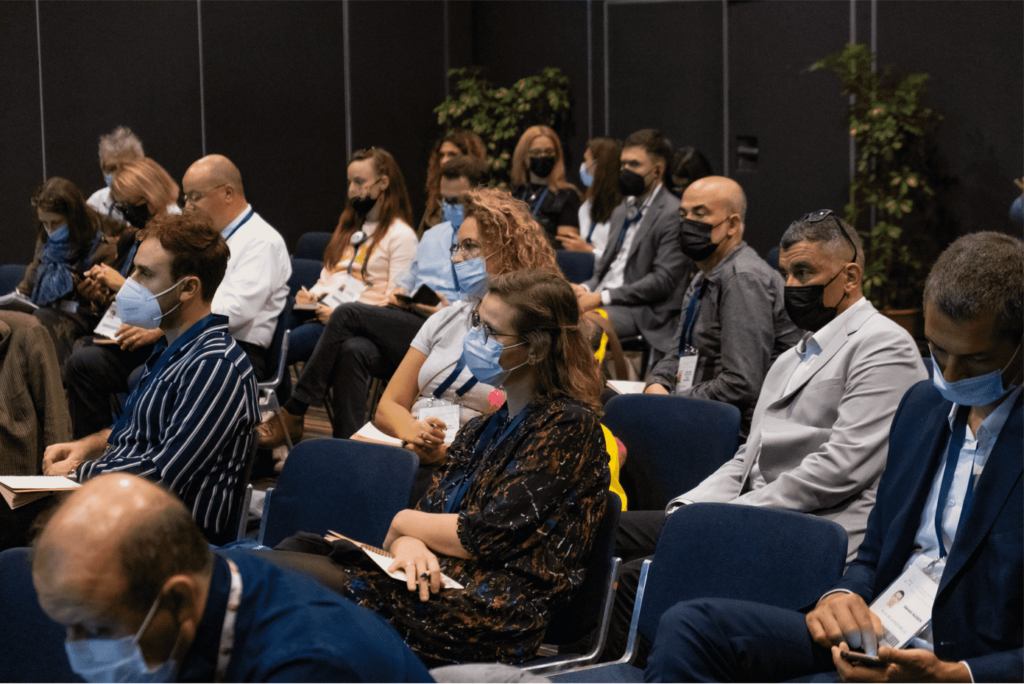Nice, France, October 2021 – Fourteen European projects that are either led by Efus or in which it is a partner were represented at the Security, Democracy and Cities conference (Nice, 20-22 October), bringing valuable inputs to the discussions through their contribution to the thematic workshops and focus sessions or via their dedicated exhibition stands.
Furthermore, three recently concluded projects presented their final publication, while other projects that are still going on capitalised on the event to organise on site their coordination meeting.
The fact that so many European projects were represented is testament to the scope of themes on which Efus is working, and of their importance for European cities and regions:

- tools and methods to analyse and prevent crime and feelings of insecurity (IcARUS, BeSecure FeelSecure and Cutting Crime Impact);
- crisis management (ALARM and RiskPACC).
It should be noted that these six topics are far from being the only ones on which Efus is working and that the conference addressed many others, as shown by the fact that there were 18 thematic workshops. However, the fact that these topics are the subject of a number of EU-funded projects shows that European institutions consider them as a priority and that they have both a local and transnational dimension.
Preventing and fighting against discrimination

In the Security, Democracy and Cities Manifesto, which will be updated on the basis of the exchanges held at the conference, Efus recommends that the issue of the prevention and fight against discriminatory violence be fully integrated in urban security strategies, and that local and regional authorities “play an active role in the fight against discrimination, based on the legal and political frameworks defined by European and national governments.” Efus also recommends increasing the diversity of local and regional authority staff and improving cooperation with legal and law enforcement authorities in order to provide better care to victims.
“When you dig deeper, all forms of discriminatory violence stem from inequalities,” Sonia Andolz, General Director of Security Administration, Ministry of the Interior – Government of Catalonia (Spain)
The conference included a thematic workshop on this topic (see the minutes). The panelists called political decision makers and local authority executives to base their security policies on the principles of the respect of human rights, inclusivity, dignity and diversity. Recognising what constitutes discriminatory violence and its various forms is a first step. It is also necessary to design and conduct targeted security audits and surveys in order to better understand acts of discriminatory violence.
> See our thematic section on discriminatory violence for more information and resources.
Preventing and fighting against polarisation and violent extremism
In its Manifesto, Efus observes that “local and regional authorities are strategically well positioned to implement actions and mobilise all relevant stakeholders” and calls for “a strong preventive approach” to radicalisation, which “threatens security and social cohesion.” On behalf of its members, Efus commits to “basing our policies on an approach that guarantees individual liberties in order to avoid stigmatisation,” strengthening cooperation among European local authorities, and “promoting the mobilisation of civil society, recognising their key role in building resilience.”
Polarisation is an underlying phenomenon that is amplified by social media and is increasingly a motive for concern for local and regional authorities, many of which struggle to identify and prevent it. The thematic workshop held at the conference enabled local and regional representatives and practitioners to exchange on their policies, challenges and progress in preventing polarisation and extremism. Many participants highlighted the need to reduce inequalities and strengthen citizen participation and transparency (see the minutes).
> See our thematic section on polarisation and radicalisation for more information and resources.
Managing nightlife
Local and regional authorities struggle to manage nightlife because it is a complex domain that involves many stakeholders and because, by nature, it is a time when most public services are either closed or considerably reduced. On the other hand, many European cities are faced with challenges regarding their nightlife, which needs to be pacified and regulated.
They must put forward a global, integrated, cross-sectoral and pragmatic response that encompasses health, security, the management and use of public spaces, and peaceful coexistence among all relevant actors (nightlife actors, residents, revellers, etc.). Such a response must be co-designed in order to prevent conflicts from flaring up at night and to enable all types of public to appropriate the night-time according to their individual needs.
Furthermore, the Nightlife Platform, a long-time partner of Efus, recently published an updated version of its guidebook Public Policies for Nightlife: Governance and Participation.

> See our thematic section on The City at Night for more information and resources.
The protection of public spaces
How to plan, design, manage, and secure these spaces while respecting fundamental freedoms? This is a complex challenge for local and regional authorities, which are striving to embed security in the design and management of such spaces in partnership with local communities.
Efus recommends taking into account the various ways public spaces are used based on objective and subjective data, involving the public in co-producing security policies, and maintaining a healthy balance between the use of security technologies and the respect of fundamental rights.
The conference included three thematic workshops on this issue: How can cities design and manage safer, more inclusive public spaces? (see the minutes), Foresight strategies to better protect public spaces and promote urban resilience (see the minutes), and The challenge of promoting safe and sustainable urban tourism (see the minutes).
“New technologies need to be considered as complementary tools to support the protection of public spaces. Smart cameras are only smart if intelligence remains in the human brain,” Marc Leoutre, Policy Officer, Counter Terrorism Unit, DG HOME, European Commission.
Many participants stressed that in order to tackle constantly evolving threats requires a common culture of public space security must be developed, based on training and co-production mechanisms. In particular, local security and crime prevention stakeholders must adopt a more holistic and multidisciplinary approach.
> See our section on Public Spaces for more information and resources.
Tools and methodologies
The rise of new technologies has brought about new tools and analysis and working methods, which allow not only for collecting more precise data but also, increasingly, to involve citizens in the design, implementation and evaluation of crime prevention strategies and actions. Efus recommends that local and regional authorities cooperate more closely with research organisations and that political decision makers regularly evaluate their security strategy based on evidence.
The conference included a thematic workshop on Know your problem to solve your problem: innovating tools and methods to address urban security challenges (see the minutes). Participants agreed that statistical data on their own do not reflect residents’ feelings of insecurity and their lived experiences. It is therefore essential to cross-check such data with information collected directly from residents. They discussed methods that can be used to encourage local residents to express their feelings of insecurity.
> See our thematic section Audits & Methodology for more information and resources.
Crisis management
Many speakers and panelists stressed that local authorities have had to face unprecedented crises in the past few years, notably the Covid-19 pandemic and climate disasters (floods in northern Europe, wildfires in southern Europe, Storm Alex in Nice…).
Efus considers that the role of local and regional authorities in managing civil protection is not recognised enough by national governments and European institutions. It promotes a ‘partnership culture’ between public stakeholders, emergency services, civil society and private partners such as transport companies, SMEs and businesses.
The recent crises have also shown that civil society has huge capacity for mobilisation. The conference included a workshop on this matter: The involvement and role of citizens in crisis management (see the minutes). Representatives of the ALARM and RiskPACC projects, in which Efus is a partner, contributed to this session.
Also, for the first time this year, the issue of climate change and its consequences on urban security was featured in the conference programme through a dedicated workshop: Climate change and urban security – how to foster urban resilience? (See the minutes).
> See our thematic section on Crisis Management for more information and resources.
> Presented at the Security, Democracy and Cities conference, the BRIDGE, LOUD and MATCH final publications are available for downloading (free of charge):





